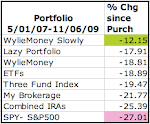"How Many Mutual Funds is Too Many?"
My answer is, "It depends."
“On what?” you might ask.
Well, a number of things.
Let's explore!
I have almost 60 funds. I can safely say, that is a ridiculous amount, but I don't mind. That brings me to point one.
1) If you don't mind how many you have, you don't have too many.
If you can't keep track of the funds, or feel overwhelmed when trying to manage your investments, you have too many. My tolerance for spending time keeping track of my funds is very likely higher than average, as evidenced by the fact that I write a blog about it. I do not recommend, doing what I do, to anyone else.
I find tools like Yodlee and Morningstar's free portfolio tool as well as the interface in each of the accounts I hold the funds in, makes it pretty manageable, for me. This brings me to my next point.
2) You need enough to achieve your goals for the money in each investment account.
My wife and I both work and we both have employer sponsored retirement plans and IRAs and we share a brokerage account. Our situation is not a-typical and that adds up to 5 accounts. Not all five are with the same brokerage and that means that funds available in some accounts are not available in others. Since the retirement accounts will remain invested until we retire and we are many years away from that, the funds best suited for very long term growth are not always the same as what we choose in our non-retirement account as we hope to use funds in that account before retirement (which is the reason we have it). Furthermore, we likely won’t tap the Roth IRAs at the same time as the 403(b)s depending on our tax situation at the time. Given all that, I choose to balance (Stock vs bond, Large Cap vs Small Cap, Domestic vs International, etc.) each of the five accounts as independent accounts. That way, as we access them at different times, I won’t have to re-balance one account because I drew down on another.
3) You need enough to attain diversity in fund companies.
I like to pick funds from different fund companies (Janus, Bridgeway, Artisan, T. Rowe Price, etc.) on top of picking funds that cover different categories (Large Cap Growth, Intermediate Term Bonds, Real Estate, Small Cap Foreign, etc.) A fund company might cover different categories, but they have one corporate culture and a pool of analysts who all work in the same environment, so there can be serious overlap in the companies that their analysts are recommending to their fund managers. Also, no one fund company has all the best managers in every category. When I picked the 20 funds for my hypothetical portfolio through Etrade, I ended up with a wide mix of fund companies without really trying.
4) You may end up with more than you need, depending on your employment history.
My employer used to allow me to use Janus for my 403(b) contributions so I had a portfolio of Janus funds. Then we switched to a company that picks top funds in each category regardless of fund company. I gladly signed up with the new, more diverse program, but I left my investments at Janus instead of rolling them over. Janus is strongly growth oriented overall and I liked having an investment at a pretty young age in a more aggressive portfolio than the new plan offers. This means I have 2 403(b)s with 8 funds at Janus and 12 in the other account. Our IRAs are held at Etrade and I cannot buy most of the funds available to me through my non-Janus 403(b) even if I wanted too. I do not want to add more in Janus funds for retirement so I am left looking for alternatives. Typically each year as I contribute to my IRA, I look for categories that I am not invested in that have been lagging, and then pick a good fund or ETF with a low minimum purchase amount (for funds) so I can diversify as much as possible. Having done this for several years and finding options that let you invest relatively small amounts, I have 14 funds in my IRA.
5) You need enough to diversify across sectors and/or categories.
You’ve heard the advice: “Invest in stocks and bonds.” And certainly you can buy a couple of index funds that broadly cover the stock and bond markets. Throw in a broad international index fund for good measure and you are pretty darn diversified with very little effort or upkeep. That approach may well be ‘enough’ to diversify across sectors. But if you want to invest systemically and try and follow a strategy of investing in categories that are down, presumably in the short term, you will need to pinpoint more specific categories or sectors. Real estate, small cap value, financial services, and precious metals have all struggled lately. To invest in these specifically you need to own funds that have these categories as their focus. How detailed you want to get will depend on your tolerance, your interest and your goals. The more detailed you get the more funds you probably need. For example, you probably would not want a portfolio of just the four sectors above unless you like to gamble.
6) You may not need any, if you have enough time and money to diversify in individual companies.
Mutual funds aren't for everyone. If I had enough money to invest in enough individual companies to feel adequately diverse (I kinda obsess over diversity so it would take a lot) and I had the time and expertise to stay on top of each company's performance and prospects, I might forgo funds and choose another path. Afterall, why pay fund managers year after year to do what you can do yourself!
7) If your time horizon is short, one may be too many.
If your time horizon is short, mutual funds or ETFs are probably not the best place for your savings. Note that portfolios of 20 funds spread across 20 sectors, 20 ETFs invested likewise and even the simple three index fund approach all lost money since May... with the 20 ETF portfolio down over 4%! Of course if you choose a money market fund, that might do well...
In summary, don’t invest in more funds than you can manage, but don’t avoid investing in a fund that interests you, if investing in it would help you meet your goals.
Recap- things to consider when trying to decide how many mutual funds is enough:
- If you don't mind how many you have, you don't have too many.
- You need enough to achieve your goals for the money in each investment account.
- You need enough to attain diversity in fund companies.
- You may end up with more than you need, depending on your employment history.
- You need enough to diversify across sectors and/or categories.
- You may not need any, if you have enough time and money to invest in individual companies.
- If your time horizon is short, one may be too many.



4 comments:
I followed your link from morningstar. You've got quite a project going on here. Nicely done.
~Ichiro
Wylie, I assumed this is your name. I just (June 2009) came across your blog and I'm wondering whether you still keep up with your blog in 2009?
If yes, I'd like to share with you that I am also keeping up with my retirement mutual fund portfolio by myself. Also like you I am considering myself above average individual investors and alocate a time researching and replacing funds on regular basis, using mainly Fidelity resources since my three Rollover, Roth and brokerage investing accounts are with Fidelity, in one place.
I am looking forward to hearing from you if you are still active with your blog mission. You are doing very nice job.
Thanks Ken. I was slacking early in the summer but it is nice to know that someone out there finds my site useful. I'm back updating now. Good luck managing your fund portfolio.
Nice post indeed.
Make website india
Post a Comment